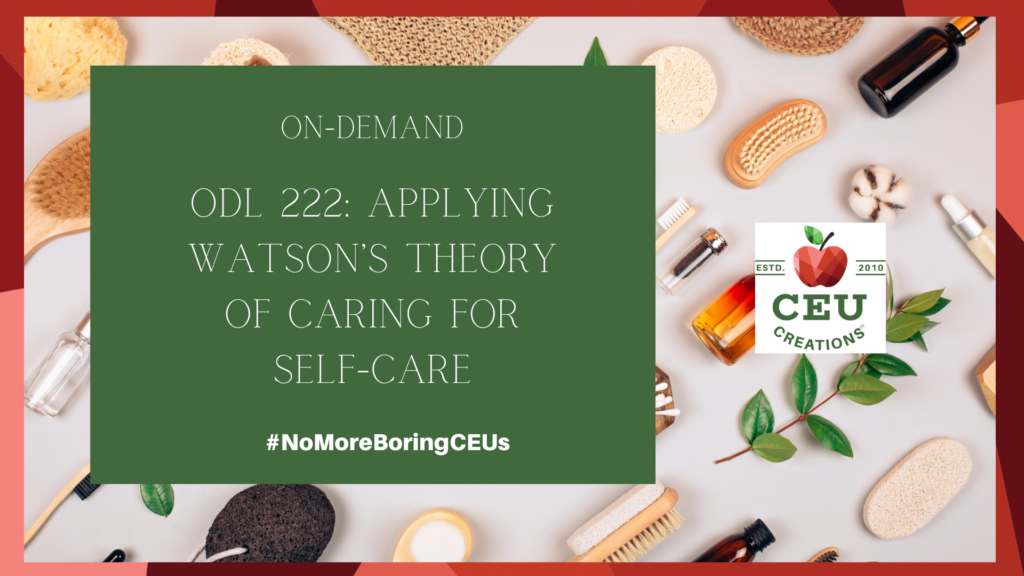On-Demand CE Training
ODL 222: Applying Watson’s Theory of Caring for Self-Care

Revised on 06/14/2024
Target Audience:
This course is targeted for social workers, case managers, nurses, and counselors.
Overview:
As those of us who work in the helping profession realize, vicarious trauma, burnout and compassion fatigue are very real and debilitating syndromes that can leave us feeling drained, depressed and physically sick with a multitude of other issues. Therefore, it is critical that we take care of ourselves in order to care for our clients, patients and families. This course is presented by Kelly Dyar, Nurse and Educator, who will review vicarious trauma and compassion fatigue, Watson’s Theory of Human Caring, and the professional ethical standards that are relevant in discussing self-care. Caring science, which guides the theory, provides an ethical and moral way of approaching caring-healing relationships, and is the essence of the healthcare profession. The theory is broken into 10 Caritas Processes that promote healing, honor wholeness, and contribute to evolving humanity. Thus, this presentation will not only introduce Watson’s theory and Caritas Processes, but will focus on how each learner can incorporate the theory into professional practice and personal habits for self-care.
Course Objectives:
By the end of the session – the participant will be able to:
- Describe compassion fatigue
- Identify professional ethics as they relate to caring for self
- Examine Watson’s Theory of Human Caring as an approach to self-care
- Identify at least one self-care strategy to help decrease the risk or impact of compassion fatigue
Presenter:
Kelly Dyar, EdD(c), MSN, RN, CNN, CNE
Kelly Dyar, EdD(c), MSN, RN, CNN, CNE, is a registered nurse with 27 years experience, primarily in the care of nephrology patients. She is on faculty at the Tanner Health Systems School of Nursing at the University of West Georgia. She also maintains a per diem clinical practice with DaVita Renal Care, providing in-patient dialysis. She maintains a life-long love of learning, especially in caring science, especially related to Watson’s Theory of Human Caring.
2 CREDIT HOURS APPROVED FOR:
Social Workers
ASWB ACE – 2 CE Credits
New York State Education Department’s State Board for Social Work – 2 Contact Hours
Case Managers
CCMC – 2 Contact Hours
Nurses
California Board of Registered Nursing – 2 Contact Hours
Counselors
NBCC ACEP – 2 Contact Hours
New York State Education Department’s State Board for Mental Health Practitioners – 2 Contact Hours
Please make sure to check with your own state board to ensure the transferability of CE credit. Some state boards may place restrictions regarding the modality of training required for ethics credits to be awarded. If this training indicates ethics credits are available, please verify that your state allows them to be earned through an on-demand course format.
